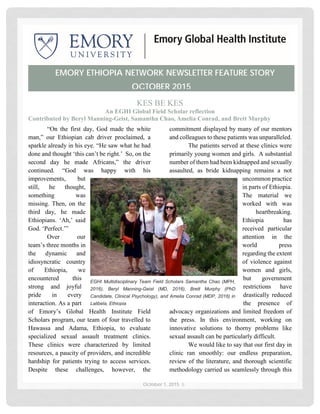Emory Ethiopia Network Newsletter
- 1. October 1, 2015 6 KES BE KES An EGHI Global Field Scholar reflection Contributed by Beryl Manning-Geist, Samantha Chao, Amelia Conrad, and Brett Murphy âOn the first day, God made the white man,â our Ethiopian cab driver proclaimed, a sparkle already in his eye. âHe saw what he had done and thought âthis canât be right.â So, on the second day he made Africans,â the driver continued. âGod was happy with his improvements, but still, he thought, something was missing. Then, on the third day, he made Ethiopians. âAh,â said God. âPerfect.ââ Over our teamâs three months in the dynamic and idiosyncratic country of Ethiopia, we encountered this strong and joyful pride in every interaction. As a part of Emoryâs Global Health Institute Field Scholars program, our team of four travelled to Hawassa and Adama, Ethiopia, to evaluate specialized sexual assault treatment clinics. These clinics were characterized by limited resources, a paucity of providers, and incredible hardship for patients trying to access services. Despite these challenges, however, the commitment displayed by many of our mentors and colleagues to these patients was unparalleled. The patients served at these clinics were primarily young women and girls. A substantial number of them had been kidnapped and sexually assaulted, as bride kidnapping remains a not uncommon practice in parts of Ethiopia. The material we worked with was heartbreaking. Ethiopia has received particular attention in the world press regarding the extent of violence against women and girls, but government restrictions have drastically reduced the presence of advocacy organizations and limited freedom of the press. In this environment, working on innovative solutions to thorny problems like sexual assault can be particularly difficult. We would like to say that our first day in clinic ran smoothly: our endless preparation, review of the literature, and thorough scientific methodology carried us seamlessly through this EMORY ETHIOPIA NETWORK NEWSLETTER FEATURE STORY OCTOBER 2015 EGHI Multidisciplinary Team Field Scholars Samantha Chao (MPH, 2016), Beryl Manning-Geist (MD, 2016), Brett Murphy (PhD Candidate, Clinical Psychology), and Amelia Conrad (MDP, 2016) in Lalibela, Ethiopia
- 2. E M O R Y E T H I O P I A N E T W O R K N E W S L E T T E R F E A T U R E S T O R Y O C T O B E R 2 0 1 5 introduction. âSeamless,â however, was a word we seldom employed in Ethiopia. Phrases like ârelentless flexibilityâ more accurately described our time there. We travelled to Ethiopia to study follow-up care at clinics implementing a comprehensive treatment model for survivors of rape and sexual assault. Originally hoping to isolate the medical, psychological, and legal aspects of this treatment model to better analyze their contribution to patient outcomes, we quickly changed our aims when we encountered a lack of documented follow-up care at these centers and a scarcity of information characterizing Ethiopian survivors of rape and sexual assault. In fact, we discovered that our data set was one of the largest cohorts of sexual assault survivors in Ethiopia, sub-Saharan Africa, and even globally. Thus, we revised our aims to better characterize the population served, identify determinants of patient outcomes, and deliver a best practices evaluation to the Ethiopian Society of Obstetricians and Gynecologists, a major stakeholder in these clinics. At these clinics, and in Ethiopia as a whole, we grew in unexpected ways. Idiosyncrasies permeate the country: while in Addis Ababa, a rogue donkey caused two Mercedes to crash in front of us, and in Lalibela during an ancient religious ceremony, we caught more than one pilgrim taking a selfie. Navigating the intersection of modernity and history in this unique culture helped illuminate our priorities, push our flexibility, and question our preconceptions. The teamâs medical student reaffirmed her dedication to working with women and girls who face adversity beyond what a research project could possibly capture. Next year, she will enter her obstetrics and gynecology residency to pursue global womenâs health. Our public health student departed Ethiopia with a newfound ability to integrate into a foreign culture, having had her first experience where she felt like she stood out from the local population. The masters of development practice student, who soon embarks on a career working in global gender-based violence, realized the need for systematic preventative efforts to complement treatment models. The clinical psychology doctoral candidate departed the country with a strong understanding that violence against women and girls is a global human rights failing that we are all impelled to address. Later in the summer, we sat around a cooking fire in the Simien Mountain range with villagers we had met on our hike. Our fragmented Amharic provided ample entertainment as we all waited for the boiled lamb to cook. We spent our time laughing and learning new phrases, both fun and heartfelt, through a combination of our meager Amharic and dismal miming. Our friends that evening described us with one Ethiopian idiom, something we all took to heart: âkes be kes enkulal be'egru yihedal,â which translates directly to âlittle by little, the egg begins to walk.â Little by little, we were being welcomed into the community that was so precious to our friends, neighbors, and colleagues. Little by little, we were finding our purpose in Ethiopia, growing our skills, and clarifying our priorities. âNavigating the intersection of modernity and history in this unique culture helped illuminate our priorities, push our flexibility, and question our preconceptions.â Team Members Manning-Geist, Conrad, and Chao in the Simien Mountains


























